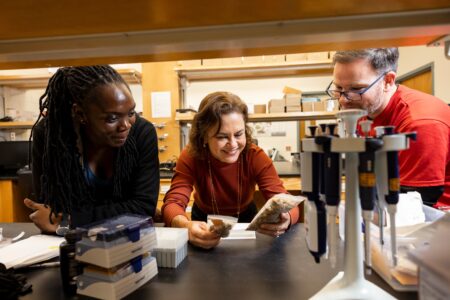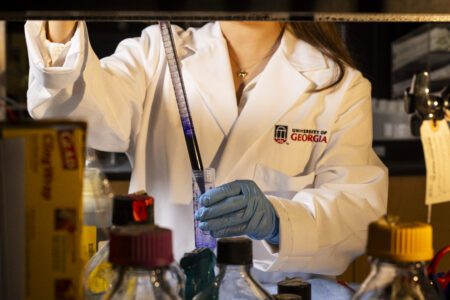
In 2025, agriculture degrees are more important than ever. Compared to the mid-20th century, the world’s population today is over three times larger. By 2050, it’s predicted to grow from the current eight billion to 9.7 billion. And this increase is taking place amidst a climate crisis that’s disrupting our food and water supplies. The science is clear on this: extreme weather events are more intense and frequent, degrading soil and drawing pests, among many other unfavourable consequences. It’s dire and our food systems are suffering.
But the best universities in the world are stepping up to contribute potential solutions. Their diverse talents on campus are leveraging advancements in agricultural technology and prioritising sustainability in all areas, from mitigation of climate change to the preservation of our natural resources. Most importantly, they’re equipping a new generation of students and academics, at home and abroad, to tackle environmental challenges and create resilient food systems that can withstand future economic and environmental shocks.
Here are four universities fusing people, passion, and progress to shape the future of global agriculture.

University of Guelph’s Ontario Agricultural College is the #1 institution for food and agricultural science in Canada. Source: University of Guelph
University of Guelph
Canada is a world of possibilities for international students. Every year, hundreds of thousands of them are welcomed into its top quality schools for an experience of a lifetime. Their return on investment is high. At the country ranked #4 in US News & World Report 2023 Best Countries for Education, they learn from professors who are world experts in science, technology and innovation and can access more than 3,000 co-op programmes. As graduates, they stand out for their knowledge, skills and experience, the kind that leads to a good career at home or in Canada.
Thriving is a given when you choose to study in Canada. It is one of the safest countries in the world and a young country that celebrates diversity, where leaders say things like “A more diverse community is a more intelligent, sophisticated and empathetic community.” In fact, the country is well-known for its few, if any, barriers for global talent to join its most important industries. As many as 37% of those working in scientific research and development services throughout Canada were born abroad. From the inventors of the Instant Pot and Blackberry to the founder of Shopify, Canada has played a key role in helping many immigrants make their mark in the STEM fields.
More recently, immigrants have played key roles in making Canada one of the world’s largest food exporters, providing products such as fish and seafood to over 200 countries every year. Whether it’s introducing green technology to extend the growing season or using research to develop more disease-resistant crops, it’s immigrants and international students in Canada that are shaping the future of global agriculture.
To join them in their changemaking journeys, the Ontario Agricultural College (OAC) at the University of Guelph (U of G) is the perfect starting point. As the #1 university in Canada, and a top-tier global leader in food and agricultural science, OAC offers undergraduate, graduate, and associate diploma programmes that are connected to all things related to food, animals, communities, and the environment.
OAC’s recent launch of career-focused master’s programmes are developed specifically for those seeking an edge when apply to lucrative jobs in food, sustainable agriculture, environmental science, animal sciences and more. The course-based programmes allow students to gain advanced skills desperately needed in Canada, and throughout the world, and include employer networking opportunities through internships or projects. A diverse community, U of G attracts international students from across the world.

The Royal Agricultural University was granted the Royal Seal of Approval by Queen Victoria in 1845. Source: Royal Agricultural University
Royal Agricultural University
Granted the Royal Seal of Approval by Queen Victoria in 1845, the Royal Agricultural University (RAU) has been at the forefront of agricultural education and a key contributor to the land-based sector for more than 170 years.
Within walking distance of the bustling town of Cirencester and just a 90-minute train journey to London, RAU offers undergraduate or postgraduate degree in areas such as agriculture, food security, agribusiness, agrifood, business and enterprise, environment, equine science and management or real estate and rural land management.
Practical skills and training opportunities and insights into global challenges and perspectives are a big part of RAU programmes. For example, BSc Agriculture students visit livestock and crop enterprises and agribusinesses to conduct research trials and check out on-farm/applied product development initiatives. BSc (Hons) Agriculture (Professional Placement Year) adds another 12 months in the workplace – you can work for prestigious companies in the UK or across the world.
Whichever programme you choose, every learner is treated as an individual and supported by a personal tutor. The university has also established an award-winning Enterprise Programme, a highly regarded Students’ Union, and is helping shape the future with industry-ready graduates.
With the global presence and influence of the RAU alumni network acting as a testament to the institution’s prestige, this is a stimulating learning environment where any student’s skills can flourish.

The Swedish University of Agricultural Sciences implements the Swedish way of studying. Source: Swedish University of Agricultural Sciences/Facebook
Swedish University of Agricultural Sciences
Sweden’s agriculture is characterised by a large dairy sector, a few crops, and the Nordic climate. With only 10% of the country’s area used for agriculture, the industry is small but slowly gaining traction, with wheat, oats, rye, and corn as its key grains. If there is a perfect time to get into agriculture in Sweden, it is now, and the Swedish University of Agricultural Sciences is the place to be.
Ranked fourth best university in the world for agriculture and forestry by QS World University Rankings, here is where you learn the foundations for a sustainable, thriving, and better world. Agriculture is seen as essential here, with the university committed to addressing challenges such as growing crops in sustainable and effective ways with minimal impact.
This is a recurring theme in many of the university’s wide range of English-taught degrees in the following areas: Economy, Rural Areas and Development, Agriculture, Biotechnology and Food, Animal Science and Veterinary Medicine, Landscape and Urban Areas, Forest, and Nature and Environment. There’s even a double degree in Agricultural, Food and Environmental Policy Analysis – where you spend your first year at one of the partner universities and your second year at another, gaining a degree from two universities.
From the BSc with a major in Forestry Science to the MSc with a major in Bioeconomy Management, all programmes emphasise the development of soft skills like critical thinking and teamwork. Here, debates and discussions are encouraged between your classmates and lecturers.
These do not just end in the classroom, though. A large part of the learning process takes place outside of class, where you will explore more either by yourself or in a group, thus improving your problem-solving skills and ability to work together as a team.
University of Queensland
The University of Queensland ranks fourth globally and first in Australia for agriculture in the latest NTU Performance Ranking of Scientific Papers. Its School of Agriculture and Food Sustainability is renowned for its interdisciplinary work in agriculture, agribusiness, food science and technology, plant and soil sciences, and animal and wildlife science — ranking 13th worldwide and first in Australia for food science and technology in ShanghaiRanking’s 2022 Global Ranking of Academic Subjects.
The school focuses on three main impact areas. For dairy science and engineering, the school partners with Dairy Innovation Australia Limited on a five-year ARC Industrial Transformation Research Hub, providing solutions to the dairy manufacturing industry. For food science researcher training, students and postdoctoral fellows participate in industry-relevant research projects at the ARC Industrial Transformation Training Centre. This collaboration involves working with the Australian Food and Grocery Council and food companies, covering science, engineering, sensory, consumer perception studies, and agribusiness.
The third area of impact focuses on food quality. Projects include identifying and quantifying traits that define superior fragrant rice, applying nanotechnology to minimise changes in milk protein powders during storage, and using genomics to enhance the cheese-making process.
Students pursuing food science and technology at the school benefit from access to its world-leading specialist research centres and facilities, including the QAAFI Centre for Nutrition and Food Sciences and the UQ Food Science Innovation Precinct. They can choose from many degree options such as Bachelor of Science with a major in Food Science and Nutrition, Bachelor of Science (Honours) specialising in Food Science and Nutrition, Graduate Certificate in Food Science and Technology, and Master of Food Science and Technology.
*Some of the institutions featured in this article are commercial partners of Study International










